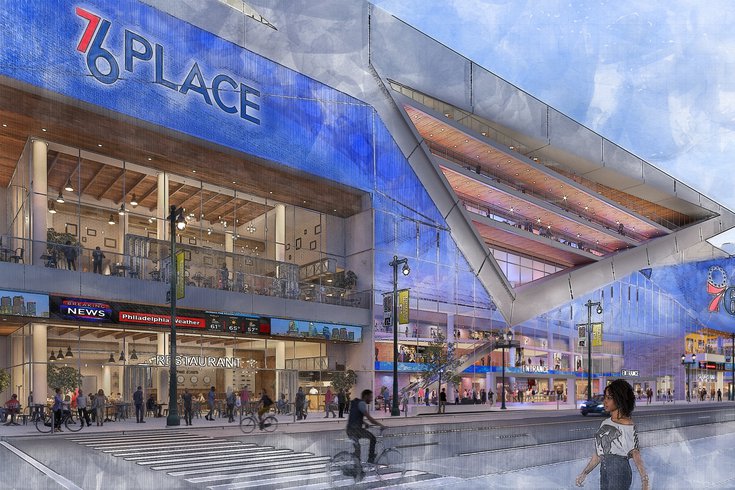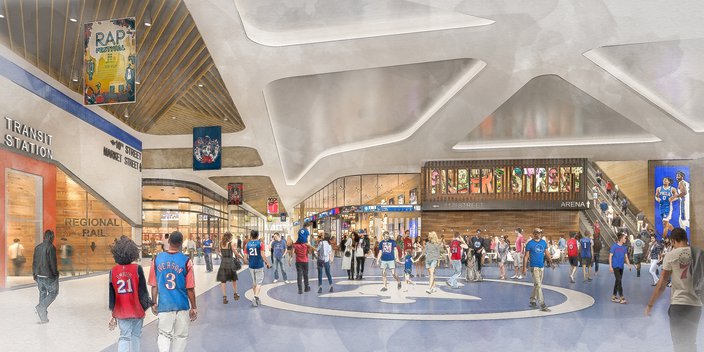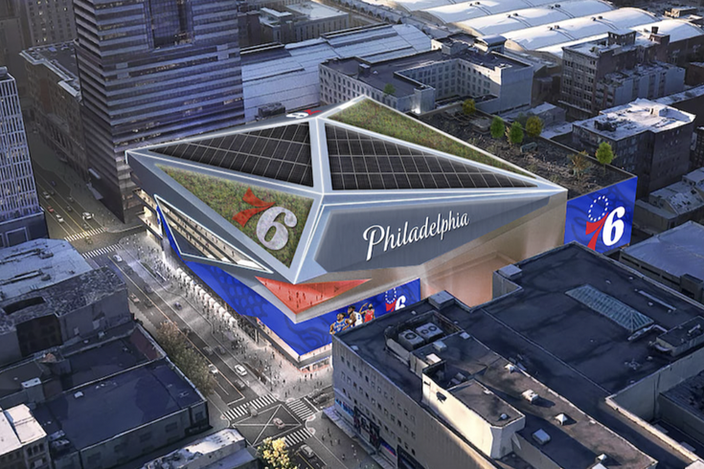
June 07, 2023
 Provided Image/Philadelphia 76ers
Provided Image/Philadelphia 76ers
The rendering above shows 76 Place, the proposed downtown arena for the Phildelphia 76ers on Market Street between 10th and 11th streets. Beginning Wednesday night, the team plans to hold a series of public meetings on the controversial project.
For the first time in five months, the 76ers will participate in a public meeting Wednesday night to discuss their proposal for a new arena in Center City, which would replace part of the Fashion District mall on East Market street, just south of Chinatown.
The developers of the $1.3 billion project, dubbed 76 Place, will present information during a 7 p.m. Zoom meeting held by the Washington Square West Civic Association. That neighborhood is one of several that surround the proposed arena site between 10th and 11th streets, a commercial corridor the 76ers contend is in an economic crisis and urgently needs private investment.
Notably, the meeting is not organized around Chinatown, which has been at the center of the opposition to the plan. The team intends to hold a mix of private stakeholder meetings and public meetings this summer. As of now, there are no scheduled public meetings in Chinatown, but the 76ers have not ruled that out.
"It's complicated. It's hard. I think it's really important. If we don't try to do things the right way, then shame on us," said David Gould, the chief diversity and impact officer for 76ers ownership group Harris Blitzer Sports and Entertainment. "My role is to try to make sure we accomplish this project in a way that serves Philadelphia."
Gould and 76ers part-owner and entrepreneur David Adelman, who has led the charge for the team's arena pitch and the attached $50 million community benefits agreement promised to leery stakeholders in Chinatown, sat down with PhillyVoice ahead of Wednesday's meeting to discuss the project.
They said the team's commitment to community investment is historic for a project of this kind, noting plans to support affordable housing, upgrade public safety infrastructure, improve services and partner with local businesses.
"That is something we think is really important to stabilize the neighborhood," Adelman said. "Regardless of the arena happening, they've been trying for a long time to see that happen, specifically in Chinatown. We think we can help, financially and experience-wise as developers, to solve a lot of those issues."
Since the 76ers shared their plans for a new arena last July, the team's direct public outreach has been relatively scant. Flashy renderings and broad project descriptions have offered a general sense of what the developers envision, but many specifics have remained undefined as the team tries to get the city's approval to move forward.
Without more clarity from the team, public debate about the arena has largely focused on the staunch opposition formed by residents in Chinatown and their allies. They fear the Sixers' plan will erode the character of the neighborhood, crowd other visitors out and drive up the cost of living. It's viewed as the latest in a series of threats to Chinatown, from the construction of the Vine Street Expressway and the Pennsylvania Convention Center to other proposals that have been defeated by the community over the years, including a Phillies ballpark and a casino.
More broadly, the 76ers have yet to share answers to a number of major logistical questions, including how the downtown arena would impact traffic, parking and public transportation.
The team plans to present more data on the project's feasibility, along with additional information about ideas for the community benefits agreement in Chinatown, at Wednesday's meeting. Among them is the possibility of constructing a high-rise on top of the arena that would include at least 20% low-income and affordable housing units.
"We would be open to and believe that we'll have the flexibility to actually build residential housing on the site of the arena," Gould said. "It could be mixed-income housing, which would allow us to also expand the supply of affordable units in the area."
The Sixers officials said this concept was suggested during conversations with Chinatown residents, who shared their concerns about preserving affordable housing and preventing the kind of displacement seen in the aftermath of similar projects in cities like Washington.
"From a physical perspective, we're not displacing one business or one resident," Adelman said. "We are taking one box, which is a portion of the current mall — a dying mall — and replacing it with another box. It's one entertainment venue for another. There's no eminent domain, which was the case for the Convention Center and Vine Street Expressway."
The 76ers released new renderings of their proposed Center City arena ahead of Wednesday night's public meeting.
Although the 76ers are willing to fund land acquisition in Chinatown and finance housing projects developed by community members, the team acknowledges that the neighborhood only has a limited number of parcels available to develop. The team also has suggested direct financing for down payments on homes, subsidizing existing affordable units and partnering with the city on other affordability solutions.
Critics say the general theme from the 76ers has been to affirm their willingness to be a strong community partner, but then maintain an overall vagueness that hasn't resolved any of the skepticism in Chinatown.
"Developers did not have any open meetings with the Chinatown community until the community organized its own town hall in December 2022, which developers left early," Mohan Seshadri, executive director of Asian Pacific Islander Political Alliance, said when asked about Wednesday's meeting. "We haven't seen them since. Ignoring the community and withholding information is not the right way to go about this, and raises serious concerns about transparency."
The team has continued to pursue political support and city approval for the arena, hoping to follow a projected timeline that would start demolition at the mall in 2026 and begin the arena's construction in 2028. On that front, the 76ers have touted their progress in building diversity-led programs with future construction partners on the arena.
But in Chinatown, uncertainty and dread have lingered over the effects that years of construction will have before any potential benefits can be felt. More frustrating, from the outside looking in, has been learning about the team's efforts to get the project green-lighted before presenting a complete plan to the communities most affected, Seshadri said.
The team has made headlines for trying to fast-track the city approval process, for allegedly backing a Super PAC tied to former mayoral candidate Jeff Brown, and for an ethics complaint regarding a lobbying firm it hired to meet with city leaders.
"They said they want to build this 'the right way,' but have acted in secrecy and bad faith from the start," Seshadri said.
The 76ers seem to recognize that the gaps in information and lack of completeness in their plans have become a problem in how the project is perceived. But the team also sees this as a function of trying to build an arena based on stakeholder input, and knows that City Council will hold hearings that offer opportunities for public testimony.
"It's kind of unprecedented to announce a plan like this eight years in advance," Adelman said. "The whole goal was to go out on a listening tour. We want to make this the best, robust project that wins for everybody. We do that by having lots of conversations. Some of them have been very good and some of them have been tough. We look at this like, let's get everyone's wish list and let's get everyone's pain points, and then let's come up with something that takes all of those things into account. It's certainly been an iterative process."
To date, most of the team's community engagement has happened with small stakeholder groups behind closed doors. At the meeting in Chinatown last December, Gould said he wasn't given much chance to have a productive dialogue with residents.
"That meeting that we were invited to, I was told I wasn't allowed to actually present on the project. I was just allowed to answer questions," Gould said. "I was barely given two seconds to start to answer questions before I was shouted down."
At another, smaller public meeting in Chinatown, Gould said things went more smoothly. He was able to go through different facets of the team's vision and received a mix of feedback from residents.
"There have absolutely been folks who have told me that they have concerns, but privately, they could see that this could work or help Chinatown if it's done right — which is a very important 'if,'" Gould said. "They don't feel comfortable saying that publicly. It's not my place to share who they are publicly, and I understand their concerns based on the environment that's been created. Frankly, I think folks are concerned about the optics of engaging in that kind of conversation with us before the project is finalized and while it's still being debated."
Opposition from the Chinatown coalition has been consistent all year, including an anti-arena march and rally planned for Saturday at 11 a.m. in Center City.
If the 76ers have been frustrated by the visibility the Chinatown activists have garnered, the team's own reticence about its plans also has played a role in the current public perception of the arena.
The 76ers have tried to refine a plan that's responsive to multiple sources of community feedback. That includes not only Chinatown, but neighborhoods like Midtown Village and Washington Square West as well as SEPTA, Jefferson University, Reading Terminal Market and other stakeholders on Market Street.
Team officials insist they're not withholding details to keep secrets. Rather, the details are still being worked out and can only be brought into focus if communities welcome the conversation.
"We don't want to release something that's not complete and then it's going to change, because that just creates more confusion," Gould said. "If we came out with a fully baked plan, that would have been even worse. Then we would have made a bunch of decisions in a room without talking to anybody, which is really antithetical to how we want to proceed with the project."
The 76ers officials said they were invited by the Washington Square West Civic Association to present new information about their proposal this week, including updates on how the team plans to deal with traffic and other issues.
"We want to kind of debunk and demyth some of the stuff related to the parking and our ability to handle that," Adelman said.
City Councilmember Mark Squilla, whose First District covers the proposed arena site, also will speak at the meeting.
Comcast Spectator, the 76ers' landlord at the Wells Fargo Center, will be there, too. The company is expected to make the case that the 76ers should remain at the South Philly arena, which has undergone $400 million in renovations in recent years. But Gould reiterated that the Sixers "have no intentions" of playing there after the team's lease expires in 2031.
Comcast Spectator largely has stayed out of the public debate about the arena proposal. CEO Dan Hilferty, who took the reins earlier this year, has expressed a desire to work with the 76ers to identify ways to keep them invested in building up South Philly.
"We have big plans to make the Sports Complex a world class sports and entertainment district as part of the broader revitalization of South Philadelphia, which already includes billions in public and private investment into FDR Park, the Navy Yard, the Bellwether District and more," a Comcast Spectacor spokesperson said.
The 76ers know that familiar refrain, but they want to challenge Philadelphia to be ambitious in new ways. Team officials point to 28 NBA teams with downtown arenas. Only Chicago's United Center is positioned a similar distance from its downtown as the Wells Fargo Center is from Center City.
"We understand, the muscle memory for people in the city has been going to South Philadelphia for games," Gould said. "They're not used to something new and something different."
Gould and Adelman provided new details and research they've conducted specifically related to the logistics of an arena on Market Street. The core of the team's strategy to make an 18,500-seat arena work in Center City is increasing fans' use of public transportation to attend games, they said.
A rendering of 76 Place in Center City.
The construction of the arena on top of Jefferson Station, which is accessible from various SEPTA lines and PATCO, acts as the pillar of the team's plan to host basketball games, concerts and other events on East Market Street. The team expects the arena to be in use at least 150 nights per year, with opportunities for other events like graduations and banquets.
Adelman was not a team owner when the Sixers submitted a plan to build a new arena at Penn's Landing in 2020. That proposal was rejected as part of the city's RFP process, but Adelman said he was not a fan of it because of its mass transit limitations.
"The biggest driver, No. 1, was transportation," Adelman said. "It could have been scenic on the water like the Miami arena is, but for me, it didn't create the energy that I'm hoping we create here."
The 76ers believe Center City has proven its capacity for hosting heavily-attended events like Philadelphia Flower Show and Philadelphia Auto Show, but current data on public transit use for sporting events in South Philly should be somewhat concerning to them. The team says only about 15% of 76ers fans currently use public transit – primarily the Broad Street subway – to attend games at the Wells Fargo Center.
Team officials are optimistic they can get that number closer to 50%. They're relying mainly on survey data from season ticket holders, along with inferences they've drawn from data assembled internally and from other stakeholders.
One analysis conducted by Langan, the traffic engineer hired by the team, concluded that train rides from Philly's suburbs to the new arena will be 40 minutes quicker, on average, than current drives to the Wells Fargo Center.
The team also obtained data from Uber showing that the vast majority of rides currently taken to 76ers games come from Center City. If the arena is downtown, team officials reason, then these fans presumably would walk or take public transit. They're even willing to pay for SEPTA and PATCO passes for season ticket holders during the first season in the new arena, Adelman said, calling it an incentive for environmental responsibility.
To assist fans who drive to games, the 76ers will rely on technology that guides fans to 29 parking garages that contain 9,000 spaces within walking distance of the arena.
"If you have a parking pass on your phone from the team, you'll be able to be geolocated," Adelman said. "If you live in Broomall and you're driving, we will geolocate you, pre-paid, to one of the 29 parking garages that we think would reduce your traffic flow and city congestion. We want to bring people in and direct them to an appropriate garage. The technology exists today. It will only be better in eight years."
The team officials said they're confident the city's parking garages and streets can handle game-day traffic because the arena's location will stagger when people come and go. Adelman said 76 Place will have four times as many entry and exit points, as well as many more streets for fans to access in Center City than they currently have at the Sports Complex in South Philly.
Whether the 76ers' outlook stands up to the scrutiny of the city's ongoing independent study, the team officials said the team still has a lot of work to do in the community and from a development standpoint. But Adelman insisted the city cannot turn a blind eye to the decline of East Market street, where he said the boarded up buildings opposite the arena site are a sign of things to come at the Fashion District.
"For us, there are lots of constituents that we want to please in all of this, Chinatown being very important," Adelman said. "I'm not saying an arena is purely the antidote, but it's a hell of a good start. We have a real problem on our hands here."
The team officials reiterated that the Sixers do not have a "Plan B" and that other options, like building a stadium in New Jersey, are not on the table.
Gould said Philadelphia needs to challenge its reflex to say "no" to facing problems with big ideas, but he acknowledged the issues surrounding the arena aren't that simple or straightforward for everyone.
"You could say that about almost any community development project," Gould said. "I think this is one that's just on a larger scale and has a bit more of a microscope on it, given who we are and where the proposed site is."
He added: "Is there a specific formula for how we get from A to B? No, it's much more art than science. But our goal is to continue listening and being responsive until we can put forth a plan that we feel is final. Then we'll ask people to opine, support or oppose it."
Staff writer Kristin Hunt contributed to this report.
 Provided Image/76 Devcorp
Provided Image/76 Devcorp